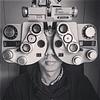Take a photo of a barcode or cover
It pains me to give up on this book. Mukherjee's first book, The Emperor of All Maladies, was a revelation to me; an insightful and eye-opening look at the history of cancer and the advancements we have made to cure it. It was written and constructed almost like a thriller, with cancer as the serial killer and the scientists being the detectives. The Gene, on the other hand, is a slow exploration of how it was discovered and the many ways it can be manipulated, recombined and clones -- in many ways, it is about how far we have come and where we can go in the future.
In short, it's a slog, and it reads like a textbook. If you are into biochemistry, I believe there is no better resource to learn about genes. This is as good as it gets, with every page packed with information. On the other hand, because most of the chapters feature scientists working on problems in their labs, its difficult to gain a wider perspective. That is, do these revelations have real world impacts? It does touch on these topics, sure, but it is a little too late.
I was particularly interested in the eugenics section of the book, as well as how early philosophers theorised about the nature of hereditary. Beyond that, though, this book is a well written encyclopedia. And encyclopedias are not fun to read.
In short, it's a slog, and it reads like a textbook. If you are into biochemistry, I believe there is no better resource to learn about genes. This is as good as it gets, with every page packed with information. On the other hand, because most of the chapters feature scientists working on problems in their labs, its difficult to gain a wider perspective. That is, do these revelations have real world impacts? It does touch on these topics, sure, but it is a little too late.
I was particularly interested in the eugenics section of the book, as well as how early philosophers theorised about the nature of hereditary. Beyond that, though, this book is a well written encyclopedia. And encyclopedias are not fun to read.
i hate to admit it but this was too much for me. well written, but the subject matter just didn't engage me. I know others who would surely love it
challenging
informative
medium-paced
Okay, maybe didn't quite get an existential crisis, but I did at least find myself learning way more than I ever expected to with this book. I suppose I should've at least expected to learn something when diving into a near 20-hour book about genealogy, but I have to say, as somebody who went from having almost no understanding about this subject as a whole, I now feel like I have some footing to begin to be able to understand more, and I could not be more thankful for it.
Whether going into the history of gene research, talking about extremely divisive subjects such as the effects of gene on sexual orientation, gender, sex, etc., or managing to maintain a completel neutral and objective approach through this all, this book does a really good job of instructing on an area of science that is still so unknown, but constantly having more added to its breadth. I now feel like I have a basis from which I can understand the news I keep on receiving about the human genome research still ongoing, efforts to manipulate it, etc., essentially opening up a whole new world to me.
Where I find this book lacking is something that I can not at all blame it for: it raises more questions than it answers. No kidding. Duh, I know. But I feel like there are at least some areas that if I was asking questions of all people, other people definitely would as well, particularly in reference to the effect of genes on gender-identitity determination. The book makes a lot of reference to the Y-chronmosome SRY gene that turns female aspects to male aspects, and compares this to baking with SRY being the flour that is essential. This, however, answered for none of the questions about what this means for females possessing more 'boyish' aspects. The book makes little to no reference to puberty and the effects of testosterone or estrogen here to the point that I needed to bother a friend of mine (Thanks, Layla) to explain it to me.
Naturally, in a subject such as this, there will always be more questions than answers, but I feel like some areas could've been given at least some small more attention especially when leaving it very open-ended.
That does not change from the fact, however, how amazing this book is, and, frankly, for such complicated subject matter, very digestable. If there's any book to read to help in starting to gain knowledge about genealogy (not that I've read any others), then this is it.
Whether going into the history of gene research, talking about extremely divisive subjects such as the effects of gene on sexual orientation, gender, sex, etc., or managing to maintain a completel neutral and objective approach through this all, this book does a really good job of instructing on an area of science that is still so unknown, but constantly having more added to its breadth. I now feel like I have a basis from which I can understand the news I keep on receiving about the human genome research still ongoing, efforts to manipulate it, etc., essentially opening up a whole new world to me.
Where I find this book lacking is something that I can not at all blame it for: it raises more questions than it answers. No kidding. Duh, I know. But I feel like there are at least some areas that if I was asking questions of all people, other people definitely would as well, particularly in reference to the effect of genes on gender-identitity determination. The book makes a lot of reference to the Y-chronmosome SRY gene that turns female aspects to male aspects, and compares this to baking with SRY being the flour that is essential. This, however, answered for none of the questions about what this means for females possessing more 'boyish' aspects. The book makes little to no reference to puberty and the effects of testosterone or estrogen here to the point that I needed to bother a friend of mine (Thanks, Layla) to explain it to me.
Naturally, in a subject such as this, there will always be more questions than answers, but I feel like some areas could've been given at least some small more attention especially when leaving it very open-ended.
That does not change from the fact, however, how amazing this book is, and, frankly, for such complicated subject matter, very digestable. If there's any book to read to help in starting to gain knowledge about genealogy (not that I've read any others), then this is it.
Learned so much! I found the more recent history more interesting- Huntington’s in particular - and the ethical questions towards the end are very thought provoking. Not nearly as narrative as emperor of maladies, much more traditional non fiction
informative
medium-paced
First book I've finished since Augusta passed, and of course it's one she gave me. Interesting read on the history of the gene- it's discovery, the sequencing of the genome and the ultimate progression to modern day, where we are now exploring the manipulation of genes by humans. Couldn't help thinking of the genes of our angel face and how gene therapy could help someone like her in the future. Definitely recommend if you need to be caught up on what science can and cannot do at this point in time.
4.5 stars. I remember greatly enjoying Dr. Mukherjee's first book The Emperor of All Maladies, which was a rare five-star read for me, and I liked this one nearly as much. It's a lot of content to get through, but the short chapters help break it up into manageable sections, though I still had to take a break every two or three chapters to absorb what I was reading. (But never out of boredom, just so my brain could process everything!) Dr. Mukherjee offers a comprehensive history of genetics that hits all of the highlights (and some of the more obscure figures as well). I've read several books that cover various periods in the history of genetics, so I remembered a lot of this information, at least vaguely, but it was great to have a refresher and to catch up on some of the more recent developments and ethical issues that have arisen. I really enjoy Dr. Mukherjee's writing style, and in many ways it's as lovely to read as a fiction book, which I feel is rare for a nonfiction read. I wish he had more books out, because I would definitely read and recommend them. It takes a lot of stamina to power through a nonfiction book of this length, but it's well worth the effort, in my opinion.
You'll like this book if you like biology/genetics. It talks about the history, present and possible future of genes (from discovery to gene editing).
Took quite some time to wrap up the second half of the book. Could have been shorter/more dense/succinct. One star off for that.
Took quite some time to wrap up the second half of the book. Could have been shorter/more dense/succinct. One star off for that.
Honestly a very well written and highly informative account of the history of the gene. However, I found it to drag on, be very repetitive and read a little pro-life-y in the later chapters. Additionally, I found myself unconvinced by some of the author’s opinions and speculations about the future of gene editing.
informative
medium-paced




